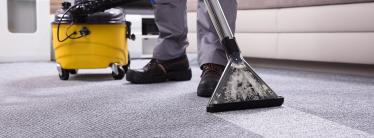

Starting a cleaning business can be an excellent opportunity for entrepreneurs looking to enter a market with consistent demand and relatively low barriers to entry. In recent years, the UK has seen a significant rise in small businesses and side-hustles as more people seek flexible work arrangements and additional income streams. A cleaning business offers a potentially profitable venture that can be started with minimal upfront investment.
Benefits and costs of starting a cleaning business
Here are some key considerations for those starting a cleaning business:
Benefits:
- Low barrier to entry – Starting a cleaning business typically requires minimal investment. Basic cleaning equipment and supplies are relatively inexpensive, and you can often start from home without a physical office.
- Scalability – Cleaning businesses can scale up. You might start as a solo cleaner and gradually hire staff as your customer base grows. This flexibility lets you expand at your own pace.
- Stable demand – There is consistent demand for cleaning services from both residential and commercial clients. Homes, offices, and businesses all require cleaning, which might mean a steady stream of potential customers.
Costs:
- Initial investment – While the initial costs are relatively low, you will still need to invest in cleaning supplies, equipment, and possibly transportation. As your business grows, you may also need to invest in marketing and hiring staff.
- Operational costs – Ongoing expenses include cleaning products, equipment maintenance, professional indemnity insurance, and transportation. If you hire employees, you’ll need to account for wages, benefits, and employers’ liability insurance.
- Time and effort – Running a cleaning business can be hard work, especially in the beginning. You’ll need to manage customer relationships, handle scheduling, and ensure high-quality service.
How much does it cost?
Starting a cleaning business has relatively low entry costs compared to many other businesses, but there are still several expenses to consider. Understanding your initial investments can help you budget appropriately.
Cleaning supplies and equipment
Many cleaners start with the essentials.
Basic supplies include:
- Multi-purpose cleaners, disinfectants, and specialist solutions
- Microfibre cloths, mops, brooms, and dusters
- Vacuum cleaner (residential or commercial grade, depending on your focus)
- Gloves, masks, and other protective equipment.
Remember that you might not need everything right away. If your business grows and profits increase, you can expand your supplies.
Transportation
You might also need to consider how to get to jobs:
- Fuel costs for travelling between customers
- Vehicle maintenance and repairs
- Potential need for a dedicated work vehicle if serving commercial clients.
Business registration and insurance
On top of your cleaning supplies, you might also need to protect yourself legally and financially with:
- Business registration fees (starting from £50)
- Employers’ liability insurance – which could, for instance, cover legal costs and compensation if a cleaner becomes ill and blames it on your cleaning chemicals
- Public liability insurance – which could, for example, protect cleaners from financial harm if spills or accidents damage someone’s property
- Portable equipment insurance – which could help protect you from the impact of breakages and theft of personal equipment
- Vehicle insurance for business use of your car or van.
Marketing and advertising
Finally, you might build your customer base through:
- Website creation
- Business cards and leaflets
- Local online advertising
- Branded shirts or uniforms
- Signage for your vehicle or shop.
The costs of running a cleaning business vary based on factors like business size and location. Starting small with residential cleaning can cost as little as £1,000, while a commercial cleaning operation may range from £5,000 to £25,000 or more. For many new business owners, the key is to start with what you need and scale as your customer base grows.
You can browse our start-up business blog hub for more information on topics like how to start a business, how to write a business plan, and how to build a brand identity.
Types of cleaning businesses
There are various types of cleaning services, including:
- Residential cleaning
This includes cleaning homes and flats. It typically involves regular housekeeping tasks such as dusting, vacuuming, and mopping. It might also involve specialised services like move-in/move-out cleaning, carpet cleaning, and window cleaning.
- Commercial cleaning
This is for offices, shops, healthcare facilities, hospitality and more. It often includes tasks like cleaning floors, sanitising toilets, window cleaning, and reception area maintenance.
Commercial cleaning businesses often work on a larger scale. It might also involve after-hours cleaning and extra safety protocols (especially for healthcare/food service).
Legal requirements of a cleaning business
On top of various tax requirements and employment regulations, cleaning businesses in the UK must meet various obligations to remain compliant.
Licences and regulations
Whether or not these licences apply to you depends on the type of cleaning you do.
However, you might need to consider the following:
- Waste Carrier Licence – if you remove waste from client premises. You can register with the Environment Agency (England) (external link), Natural Resources (Wales) (external link), the Scottish Environment Protection Agency (external link), or the Northern Ireland Environment Agency (external link).
- Chemical Handling Regulations (external link) – if you use professional-grade chemicals, compliance with the Control of Substances Hazardous to Health (COSHH) Regulations is mandatory.
- Working at Height Regulations 2005 (external link) – if offering services like high-level window cleaning, additional regulations apply.
Insurance
- Employers’ Liability Insurance – if you employ staff, you might be legally required (external link) to have employers’ liability insurance with a minimum coverage of £5 million. This can protect against claims from employees who become ill or injured due to their work.
- Public Liability Insurance – if you work with or around members of the public, people can take you to court claiming for bodily injury or propery damage. This insurance can help protect against such claims.
- Commercial Vehicle Insurance – if using a vehicle for business purposes.
Business Registration
Whether you are a sole trader, limited company, or partnership, all cleaning businesses must be properly registered.
Sole trader: Register with HMRC as a sole trader (external link).
Limited Company: Register with Companies House (external link) and HMRC (external link).
You will need to:
- Choose a unique company name
- Appoint a director and/or shareholder or guarantor (who can be a director)
- Prepare a ‘memorandum of association’ and ‘articles of association’
- Register your company address
- Send the necessary paperwork to Companies House.
Partnership: Each partner must register as self-employed with HMRC and choose one partner to handle the Partnership Tax Return (SA800) (external link).
Pricing your services
Setting the right prices for your services can be crucial when running a successful cleaning business. It is typically advised that pricing strategies should balance competitive market rates with proper compensation for your time, expertise, and costs.
Hourly pricing
Cleaning businesses often charge by the hour, which can offer flexibility and helps ensure you’re paid for all the time you spend on a job.
For example, it might take longer and cost you more to clean a three-bedroom historic house with multiple fireplaces and delicate period features (which has many nooks and crannies, plus sensitive materials requiring specialist cleaning solutions) than it takes you to clean a three-bedroom new build with minimalist décor and modern surfaces.
Example: £15-30 per hour per cleaner, depending on location and service type.
Flat-rate pricing
Charging a set fee for specific services can offer clarity to customers and simplify your pricing structure for marketing purposes.
Example: £150 for a standard three-bedroom house deep clean.
Calculating your rates
There are various steps you can follow to calculate your rates. Many cleaning business owners start by calculating their costs.
Determine your costs
Work out all expenses, including:
- Direct costs: Cleaning supplies, equipment, travel expenses
- Labour costs: Your time or employee wages, including travel time
- Overhead: Insurance, marketing, admin time, accounting fees, and vehicle costs.
Add your profit margin
Profit margin represents the percentage of revenue that remains as profit after all costs are deducted. To help achieve their target profit margin, businesses calculate their costs and then add the desired percentage markup when setting their prices. Many new businesses start at the lower end (10%) and aim to increase their profit margin as they establish themselves.
Research competitor pricing
See what other cleaning companies near you charge for similar services and position your business accordingly. For example, you might choose:
- Premium pricing if you provide specialised services or exceptional quality
- Mid-range pricing if you offer competitive pricing that is affordable for a broad customer base and profitable for you
- Economy pricing if yours is a less extensive service using basic materials.
With relatively low start-up costs, flexible working arrangements, and consistent market demand, a cleaning business can be an ideal venture for those looking to start a business.
Disclaimer:
At Hiscox, we want to help your small business thrive. Our blog has many articles you may find relevant and useful as your business grows. But these articles aren’t professional advice. So, to find out more on a subject we cover here, please seek professional assistance.





